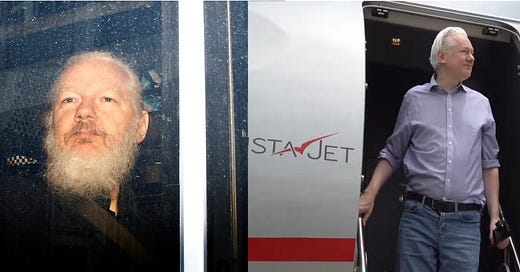After an ordeal spanning fourteen harrowing years, three days ago Julian Assange walked free into an airplane headed homewards to Australia. After having vowed to ruin Assange in every way – including covert assassination – the U.S. government relented and struck a deal accrediting time served against a plea of stealing state secrets.
As with any deal, each side compromises on its previous position and accepts some portion of the other side’s arguments. In this case, the U.S. government agreed to recognize that Assange had suffered sufficiently through fourteen years of confinement, and Assange agreed to admit that he had stolen state secrets. For a relatively young man with a new family like Assange, after having lost so many irreplaceable years, this was the best deal to strike, yet it is incorrect that Assange stole any state secrets. In fact, according to the government itself, theft of “voluntarily surrendered” information is impossible. Let me explain after a quick refresher.
Julian Assange had founded Wikileaks, a website dedicated to transparency, especially in government. In April 2010, Wikileaks released footage of an Apache helicopter machine-gunning multiple civilians and two Reuters journalists in New Baghdad, Iraq, a video which Wikileaks provocatively titled “Collateral Murder.” In July 2010, Wikileaks disclosed the “Afghan War Logs” consisting of over 75,000 classified documents which belied the sugar-coated reports about the U.S. military’s progress against the Taliban in Afghanistan. In October 2010, Wikileaks divulged “The Iraq War Logs” consisting of almost 400,000 classified documents detailing the private security contractors’ torture by rendition of prisoners of war and mounting civilian casualties, undermining the government’s propaganda about the rosy situation in a subdued Iraq. In none of these cases did Wikileaks steal this information; the U.S. government had surrendered it to third-parties, and Wikileaks simply intercepted then published it.
Third-party doctrine derives mainly from two cases from the 1970s in which majorities on the U.S. Supreme Court decided that you lose all privacy interest in information which you voluntarily surrender to or through a third-party. You may like to think that your bank transactions are secure, and that the numbers which you call/text are confidential, but the government reasons that because you expose these details to employees of the institutions handling these transactions, you relinquish any expectation of privacy therein. Third-party doctrine is in fact the premise on which the National Security Administration (hello handlers!) warrantlessly siphons unfathomable quantities of the citizenry’s sensitive digital data ranging from family e-mails to romantic text chats, justifying this interception on the fact that such data was volunteered to corporate intermediaries.
Notice though how the script flips when a governmental whistleblower surrenders evidence of government’s wrongdoing to civic watchdogs like Wikileaks. U.S. Army Private Manning, a governmental employee, leaked “Collateral Murder” to Wikileaks and the government sentenced Manning to the pokey for seven years. The U.S. government also stored data on and transferred it through the unindexed deep web, a third-party entity, which Wikileaks later retrieved therefrom, and the government was livid, pressuring private entities to deplatform and defund Wikileaks, and ultimately prosecuting Assange for espionage. It seems that confidentiality for misdeeds is sacrosanct only when it comes to government, an institution which we are frequently told is “of the people, by the people, for the people.”
Julian Assange did nothing wrong by airing the government’s dirty laundry, and if he did, then government is doing it as well, and to a far greater extent against countless citizens and organizations nationwide.





I am very glad that Assange is free. My impression of him as a person aside (he struck me as arrogant and condescending in interviews) he was attempting to even out the playing field even the tiniest bit.
I am glad that he accepted the plea deal since he has suffered more than enough for an ideal, but agreeing to take a deal seems set a precedent that any journalist that ever publishes leaked material is potentially eligible for prison time.
The other thing that strikes me about this is the fact that Assange seemed doomed... until he wasn't. I did not anticipate that Assange would get to go home... and now he is. I thought for sure that he was going to be found "self deleted under mysterious and unknown circumstances" in some American prison. But there was enough attention and pressure on his case that finally made the government give up its vendetta.
I am hopeful that if the American people can keep pressure on the government for... certain operations that maybe we can put an end to other insane escapades that our government is currently engaged in.
This is honestly the first piece of hopeful news I have heard in awhile.